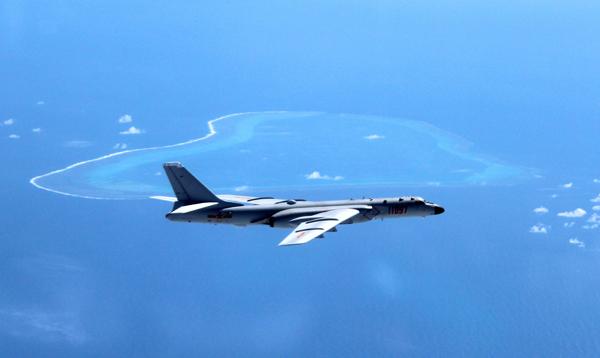You are here
China vows 'decisive response' to sea provocations
By AFP - Jul 14,2016 - Last updated at Jul 14,2016
BEIJING — China warned Thursday of a "decisive response" to provocations in the South China Sea, as it faced mounting pressure to accept an international tribunal's ruling against its claims to most of the strategically vital waters.
The Philippines, which launched the legal challenge, called for Beijing to respect the decision but sought to defuse tensions saying it would send a former president to China for talks.
China, which had already vowed to ignore Tuesday's verdict by the UN-backed tribunal in The Hague, responded with another firm warning that it was in no mood to back down.
"If anyone wants to take any provocative action against China's security interests based on the award, China will make a decisive response," Foreign Ministry spokesman Lu Kang said.
China claims nearly all of the sea — which is of immense military importance and through which about $5 trillion worth of shipping trade passes annually — even waters approaching the coasts of the Philippines and other Southeast Asian nations.
China justifies its claims by saying it was the first to have discovered, named and exploited the sea, and outlines its territory using a vague map made up of nine dashes that emerged in the 1940s.
Unlawful' China
However the tribunal sided with the Philippines in ruling China's claimed historic rights to resources within the nine-dash map had no legal basis.
It also declared that China had acted unlawfully by violating the Philippines' sovereign rights within its exclusive economic zone — waters extending 200 nautical miles from the Filipino coast.
China had done so by interfering with Philippine fishing and petroleum exploration within the exclusive zone, as well as by building artificial islands there.
China has in recent years undertaken giant land reclamation works in the Spratlys Archipelago, one of the biggest island groups in the sea which partly falls within the Philippines' exclusive economic zone.
The United States and Australia were among Philippine allies this week to quickly call on China to respect the ruling, pointing out it was legally binding.
The Philippines initially refrained from asking China to abide by the verdict — in line with new President Rodrigo Duterte's directive to achieve a "soft landing" with Beijing on the issue.
On Thursday Duterte asked former president, 88-year-old Fidel Ramos, to go to China for talks.
"War... is not an option. So what is the other side? Peaceful talks," Duterte said without providing a timeframe.
"I have to consult many people, including president Ramos. I would like to respectfully ask him to go to China and start the talks."
Ramos, who forged close relations with China when he was in office from 1992 to 1998, hinted he might not accept the offer because of his age and other commitments.
Duterte, who took office on June 30, has said he wants better relations with China and to attract Chinese investment for major infrastructure projects.
Beijing has said previously it wants to negotiate, but at the same time insists it will never concede on sovereignty.
Tougher stance
The Philippines filed the legal challenge against China in 2013 under Duterte's predecessor, Benigno Aquino. Relations between Beijing and Manila plummeted over the row.
Earlier Thursday, the Philippines offered a hardened stance with a statement detailing Foreign Secretary Perfecto Yasay's priorities when he attends a two-day Asia-Europe summit, known as ASEM, in Mongolia along with Chinese Premier Li Keqiang starting on Friday.
"Secretary Yasay will discuss within the context of ASEM's agenda the Philippines' peaceful and rules-based approach on the South China Sea and the need for parties to respect the recent decision," the foreign affairs department said in a statement.
Even just raising the issue at the summit would anger China, which has long bridled at Philippine efforts to have the dispute discussed at multilateral events.
Chinese assistant foreign minister Kong Xuanyou insisted on Monday the ASEM meeting was "not an appropriate venue" to discuss the South China Sea.
But Japanese Prime Minister Shinzo Abe also said Thursday as he left for Mongolia that he wanted the sea to be discussed at the summit.
Vietnam, another claimant in the sea, added to the pressure on Beijing.
"Vietnam asks China to immediately end moves that violate Vietnam's sovereignty," Foreign Ministry spokesman Le Hai Binh told reporters in Hanoi.
China and the United States, which insists it must help ensure freedom of navigation in the sea, had already deployed significant naval firepower into the disputed waters ahead of the verdict.
Taiwan, which has a very similar claim to the waters as China, sent a warship into the waters on Wednesday to protect its interests.
Related Articles
MANILA, Philippines — Philippine President Rodrigo Duterte said on Tuesday he expects talks with China on a long-simmering territorial dispu
VIENTIANE — Beijing came under pressure at an Asian summit Wednesday over its "illegal" island building in the South China Sea, after the Ph
MANILA — Philippine President Rodrigo Duterte's fiery rhetoric and deadly crime war are becoming a growing concern around the world, the top















